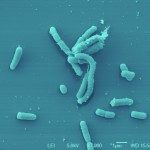Link to Pubmed [PMID] – 29145803
Link to DOI – 88210.1186/s12864-017-4242-0
BMC Genomics 2017 Nov; 18(1): 882
Small regulatory RNAs (sRNAs) are widely found in bacteria and play key roles in many important physiological and adaptation processes. Studying their evolution and screening for events of coevolution with other genomic features is a powerful way to better understand their origin and assess a common functional or adaptive relationship between them. However, evolution and coevolution of sRNAs with coding genes have been sparsely investigated in bacterial pathogens.We designed a robust and generic phylogenomics approach that detects correlated evolution between sRNAs and protein-coding genes using their observed and inferred patterns of presence-absence in a set of annotated genomes. We applied this approach on 79 complete genomes of the Listeria genus and identified fifty-two accessory sRNAs, of which most were present in the Listeria common ancestor and lost during Listeria evolution. We detected significant coevolution between 23 sRNA and 52 coding genes and inferred the Listeria sRNA-coding genes coevolution network. We characterized a main hub of 12 sRNAs that coevolved with genes encoding cell wall proteins and virulence factors. Among them, an sRNA specific to L. monocytogenes species, rli133, coevolved with genes involved either in pathogenicity or in interaction with host cells, possibly acting as a direct negative post-transcriptional regulation.Our approach allowed the identification of candidate sRNAs potentially involved in pathogenicity and host interaction, consistent with recent findings on known pathogenicity actors. We highlight four sRNAs coevolving with seven internalin genes, some of which being important virulence factors in Listeria.




